By Stacy Brocker, State Leader, Decoding Dyslexia MD, Howard County
George Orwell said, “Myths which are believed in tend to become true.” The philosophy many seem to subconsciously embrace is, “Myths which are believed in are true.” This may be why there was some resistance to HB 910, the Reading Screening & Interventions bill, during the recent Maryland General Assembly session. There are a myriad of myths surrounding struggling readers and dyslexia, and dyslexia advocates work tirelessly to dispel these myths and put reading research into the hands of policy makers and teachers.
Currently, at least 38 states have one or more dyslexia laws while 19 states have comprehensive dyslexia laws. These comprehensive laws include mandates for early reading and dyslexia screening as well as intervention, structured literacy teacher training for both pre-service and inservice teachers, a definition of dyslexia, and accommodations for dyslexia. Only a handful of states do not have any requirements for addressing dyslexia: Idaho, Maryland, Montana, Massachusetts and the Dakotas (https://improvingliteracy.org/state-of-dyslexia).
Decoding Dyslexia members pour over research about reading and dyslexia and often educate their local Boards of Education, Superintendents, administrators, and teachers meeting by meeting...by meeting. The numbers of students in need of support is growing. Research statistics show that dyslexia affects up to 17% of all students and many more struggle to learn to read in our public schools. Decoding Dyslexia is increasingly leading the charge to support parents in their efforts to learn about dyslexia, to gather research and data to support effective instruction, and to advocate for systemwide policy change for early screening and interventions that help all students.
On May 12, 2015, the Maryland General Assembly and Governor Larry Hogan enacted HB 278 to authorize a Task Force to Study the Implementation of a Dyslexia Education Program in Maryland. The Task Force was established in response to parent, teacher, and student testimony that reading difficulties and dyslexia were not adequately addressed by public schools in Maryland. This massive undertaking resulted in a 135 page in depth report that includes a remarkable amount of scientific data, expert testimony, and current practices from school districts and other states.
The report included six detailed recommendations that could be implemented and measured in a six year Reading and Dyslexia Pilot Program for Kindergarten, first and second grade students. The Pilot included a summer reading institute for teachers and mentors and an itemized fiscal note. Unfortunately, at the close of the 2017 legislative session, the recommendations in the Task Force Report remained unaddressed.
This year, Decoding Dyslexia MD, to which I and my daughter proudly belong, focused its legislative efforts on accomplishing something the current public school system has not been able to do: Help all students learn to read by identifying their reading risk factors before they fall behind. Armed with the knowledge that other Decoding Dyslexia chapters won battles to change their laws, and with the Maryland Dyslexia Task Force report in hand, Decoding Dyslexia MD got to work.
Joining with other statewide advocates for children, Decoding Dyslexia Maryland and the MD School Psychologists Association, supported HB 910 as a first step in the process to implement the Task Force recommendations. Advocates partnered with Delegate Eric Luedtke and Senator Joan Carter Conway to introduce the The Reading Screening & Interventions Bill (HB 910/SB548). After more than four subcommittee meetings, the House Ways and Means Committee unanimously approved HB 910 with amendments that addressed technical issues and concerns of local districts. The House of Delegates passed the bill 135-1 and sent it to the Senate.
The Senate Education, Health and Environmental Affairs Committee amended HB 910 at the request of school districts, striking language that would have required schools to follow federal requirements to use reliable and valid screening tools. The amendments also removed language that required screening instruments to quickly assess specific, developmentally appropriate foundational reading skills. These skills are identified in reading research as highly predictive of future reading development, including reading difficulties such as dyslexia. The Senate version of HB 910 passed the full Senate 43-0 and differed significantly from the House version.
The journey came to a head this past Monday, April 9, 2018 on the last day session or sine die. It was a hair-raising 15-hour day of back and forth. Joined by other members of Decoding Dyslexia MD and representatives for the Maryland State Education Association, Delegate Luedtke and advocates persisted through various blocks and hold ups. Finally, House and Senate Conferees signed off on compromise language and the House of Delegates immediately voted YES at 11:38 p.m. Celebrations were quelled, however, when it became clear that the Senate had not done the same, thus killing the bill.
Decoding Dyslexia MD’s Facebook and Twitter feeds were filled with concerned constituents listening live from their homes to the proceedings and following the updates. Various DDMD county chapters were conferencing with each other. There is a distinct kind of disappointment when a proposal that could help all children, including those with dyslexia, is so close to being available and then is silently killed with no explanation. Fortunately, there is also a distinct and fiery kind of resilience and fortitude that is born from such experiences. That is what I witnessed in the moments after Decoding Dyslexia MD’s bill was deemed dead—I saw a community ignited.
People who prefer to think like Barbra Streisand, “Myths are a waste of time...and prevent progression,” will be the people who finally dispel the myth that young children cannot be screened for reading difficulties and be provided early intervention. Preventing reading failure by employing best practices for reading screening is backed by voluminous research. DDMD’s 2019 bill will also be informed by the recent partnership between the National Center on Improving Literacy and St. Mary’s County Public Schools to create a “Beacon Site Screening Pilot” project.
Decoding Dyslexia Maryland advocates look forward to a different result in 2019, and an energetic celebration as Maryland moves forward to support every student’s right to read.
About the Author: Stacy Brocker is mom to five and her daughter Abi, who is in high school, has dyslexia. Stacy is co-leader of the Howard County chapter of DDMD. If you would would like to learn more about a chapter near you, please visit our Local Chapters Page or Join DDMD today (it's free)!
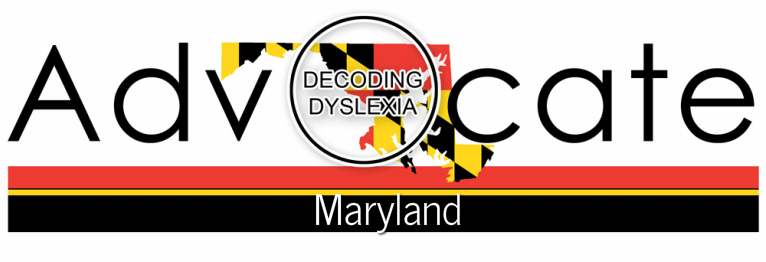
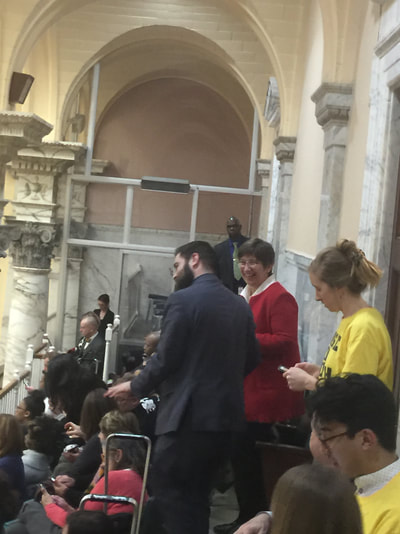
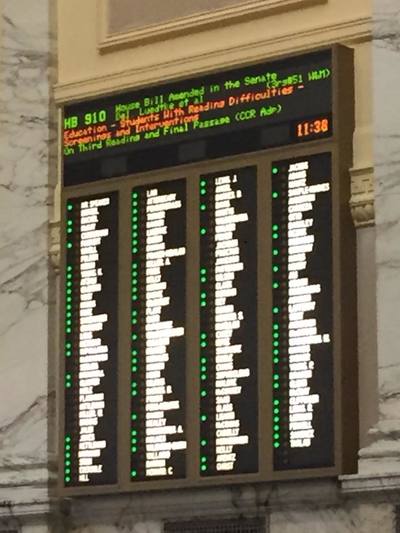
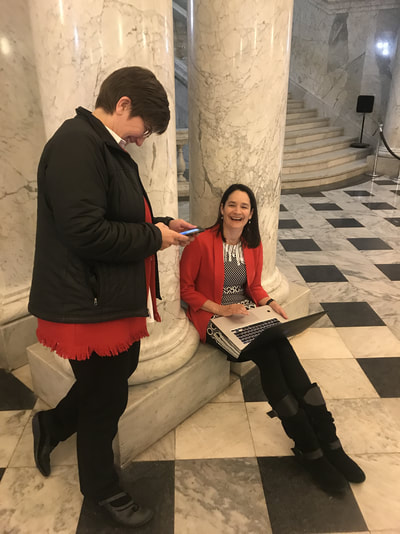
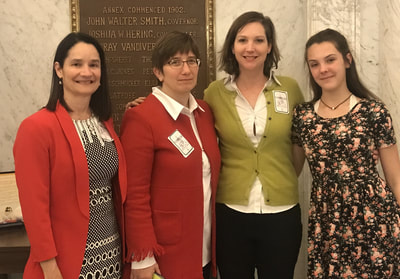
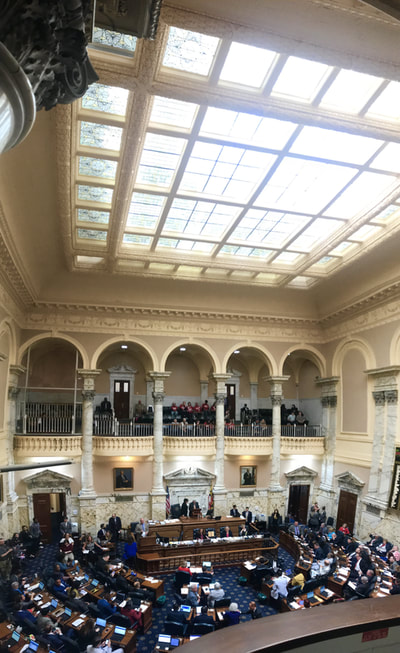
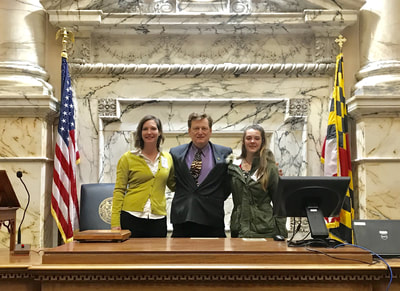
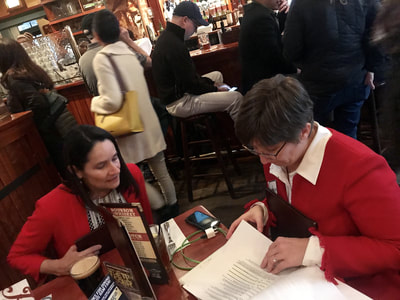
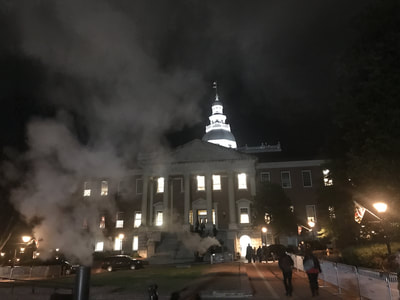
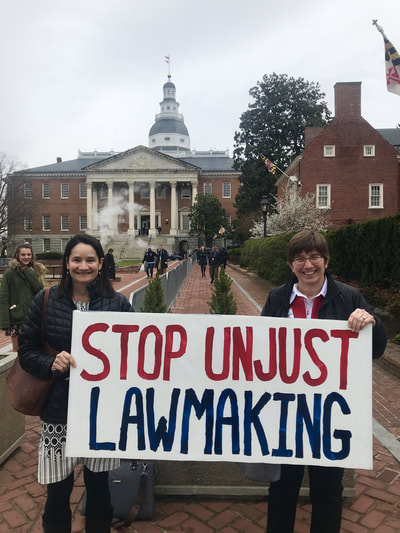
 RSS Feed
RSS Feed